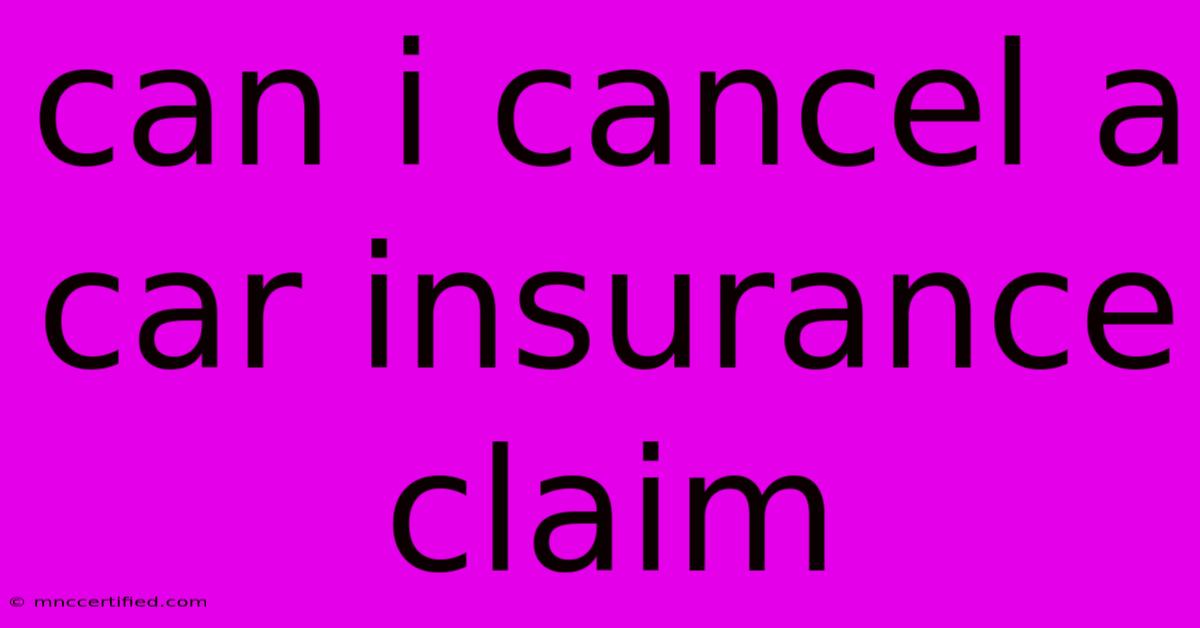Can I Cancel A Car Insurance Claim

Table of Contents
Can I Cancel a Car Insurance Claim? A Comprehensive Guide
Thinking about canceling your car insurance claim? It's a decision with significant implications, so understanding the process and potential consequences is crucial. This guide explores when you can cancel, the process involved, and the potential repercussions.
Understanding Your Right to Cancel
The ability to cancel a car insurance claim depends largely on where you are in the claims process and the specifics of your policy. There's no universal "yes" or "no" answer. Several factors play a critical role:
Before the Insurer Investigates:
If you've just filed a claim and the insurance company hasn't started its investigation, you likely have more leeway. You can generally withdraw your claim, although the process may vary depending on your insurer. Contact your insurance company immediately and clearly state your intention to cancel. They'll likely have a specific procedure to follow, potentially involving completing a form or sending a written request. This early cancellation often leaves no mark on your record.
After the Insurer Starts Investigating:
Once the insurer begins its investigation—which could involve contacting witnesses, reviewing police reports, or appraising damage—canceling becomes significantly more complex. While technically possible in some situations, it's considerably more difficult and may have consequences. The insurer has already invested time and resources, and withdrawing at this stage might damage your relationship with them. You could face:
- Increased Premiums: Future premiums might increase due to a perceived higher risk profile, even if you eventually don't need a payout.
- Policy Cancellation: In some cases, the insurer might cancel your policy entirely. This is less likely with a minor claim, but it's a possibility with a larger or more complex one.
- Negative Impact on Future Claims: While not always the case, a withdrawn claim might impact future claims, making it harder to receive coverage.
After Repairs or Settlements Begin:
Once repairs have commenced or a settlement has been agreed upon, canceling a claim is generally not possible. You've accepted the insurer's offer or implicitly agreed to the repair process. Attempting to cancel at this point would likely be met with refusal.
Reasons for Cancelling a Car Insurance Claim
There are several reasons why someone might consider canceling a car insurance claim:
- Minor Damage: The damage might be less significant than initially anticipated, and repairing it yourself might be more cost-effective.
- Relationship with the Other Party: If you know the other driver and want to resolve the issue amicably outside the insurance process, you may cancel the claim. This often involves a private agreement about who pays for repairs.
- Policy Deductible: Your deductible might exceed the cost of repairs, making the claim financially impractical.
- Fear of Premium Increases: Worry about future premiums rising after filing a claim is understandable. However, consider the potential cost of self-paying for significant damages versus a slight premium increase.
Steps to Cancel a Car Insurance Claim
The steps for canceling a claim depend greatly on the stage of the claims process. Always:
- Contact your insurer immediately: A phone call is often the quickest way to start the process, but follow up with a written request.
- Explain your reasons clearly: Provide a concise explanation for canceling the claim.
- Obtain written confirmation: Ensure you receive written confirmation of the cancellation to avoid future disputes.
- Understand the consequences: Be aware of any potential impacts on future premiums or your policy.
When to Seek Legal Advice
If you're unsure about your rights or the potential consequences of canceling a claim, consult with a legal professional. They can provide tailored advice based on your specific situation and local laws.
Conclusion: Weigh the Pros and Cons Carefully
Canceling a car insurance claim should be a carefully considered decision. Weigh the potential benefits against the possible negative repercussions before acting. Understanding your insurer's policies and seeking professional advice when necessary are essential steps in this process. Remember to always prioritize clear communication with your insurer. By following these guidelines, you can navigate the complexities of canceling a claim effectively and protect your interests.

Thank you for visiting our website wich cover about Can I Cancel A Car Insurance Claim. We hope the information provided has been useful to you. Feel free to contact us if you have any questions or need further assistance. See you next time and dont miss to bookmark.
Featured Posts
-
New Cobra Kai Season 6 Episode Release
Nov 16, 2024
-
Live Score Portugal Defeats Poland 2 0 In Uefa Nations
Nov 16, 2024
-
Hadron Specialty Insurance Company
Nov 16, 2024
-
Colony Specialty Insurance Company
Nov 16, 2024
-
Lenny Rushs Age And Background
Nov 16, 2024